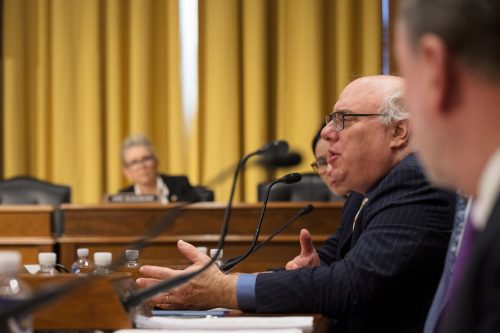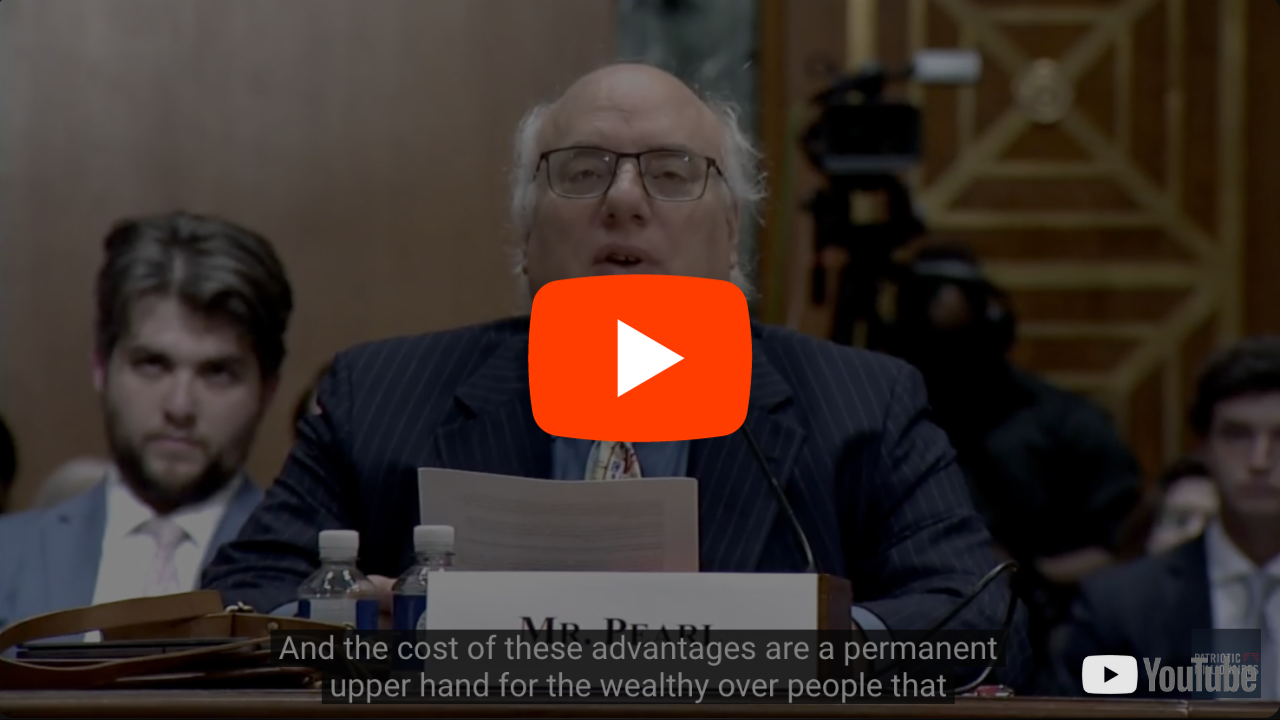The Patriotic Millionaires are always up to exciting things, but today was exceptional: our Chair, Morris Pearl, testified in person before the Senate Committee on Finance at their hearing, “Examining How the Tax Code Affects High-Income Individuals and Tax Planning Strategies.”
The hearing focused on the ways in which the tax code treats wealthy Americans like Morris and our members, with a particular focus on the “Buy, Borrow, Die” scheme that millionaires and billionaires use to fund their extravagant lifestyles and avoid taxes. Morris and three other witnesses each gave prepared remarks and then answered questions from Chairman Wyden, Ranking Member Crapo, and other members of the committee.
In his testimony, Morris illustrated the various ways in which the tax code unfairly benefits wealthy people like him over working Americans. Among other things, he highlighted the fact that capital gains, i.e. the way most rich people make their money, are not taxed on a regular basis; that capital gains are taxed at lower rates compared to ordinary income; the way in which the “Buy, Borrow, Die” scheme and the stepped-up basis allows wealthy families to transfer wealth from generation to generation completely tax-free; and the lack of progressivity in the federal income tax brackets. Morris concluded his remarks by stressing that a tax code that forces money to “trickle up” to wealthy people like him, even more so than it already does, is economically unsustainable.
You can watch a video of his full remarks here:
For your convenience, here are Morris’ written remarks as submitted to the Committee:
Chairman Wyden and Ranking Member Crapo, thank you for giving me the opportunity to speak today. I had a long career on Wall Street and currently serve as the Chair of Patriotic Millionaires. But most importantly for the purposes of this hearing, I am exactly the kind of very wealthy individual that our tax code is designed to advantage.
The cost of those advantages are:
- A permanent upper hand for the wealthy over working people
- Economic instability from an extreme concentration of wealth and income at the top
- An eroding consumer base and tax base
- And social instability as more and more people realize that putting in a hard day’s work is no longer a path to dignity and a financially stable life.
The original sin of our tax code is the way we value money and wealth over work and wages. Your constituents who work for a living have taxes deducted from their paychecks every single week. I earn money by just watching the numbers on my brokerage statement go up, and I can decide to have that income become taxable if and when I feel like it. We do not tax capital gains until the time of sale, which means for people like me, taxes become essentially optional. We can take out low-interest loans to fund living expenses, never realize the capital gains so never pay taxes on them, and when we die, thanks to the step up in basis, we’re able to pass that wealth on to the next generation completely free of income tax, and the whole “Buy, Borrow, Die” process starts again. People who are rich don’t need any “taxable” income. The money made by investors should be subject to taxes just like the money made by your constituents who work for a living. That is the essence of the proposed legislation from Chairman Wyden and from President Biden.
My own family benefited from the step-up basis rule in 2009, inheriting shares of Berkshire Hathaway that had a gain of over sixty-two thousand percent. We enjoyed millions of dollars of gains on which no one had ever paid any income taxes, and on which no one ever will pay any income taxes.
Even when I do choose to realize those gains and pay taxes, the rate is far below the rate paid by people who earn that much from their work. This is supposed to incentivize investment, which fundamentally misunderstands what drives investors like me. My options are to invest my money, and get some growth, or stuff it under a mattress, and last time I checked mattresses don’t have great returns. Perhaps even more ridiculously, we give this same benefit to venture capital and private equity fund managers who are managing other people’s investments through the carried interest loophole. If we believe we should be using the tax code to incentivize people to enter certain professions, I would put emergency room nurses above fund managers.
Even the wealthy people who earn most of their income from work don’t experience a truly progressive tax code. Our top tax bracket for a married couple filing jointly starts at a little under $700,000. That’s a lot of money every year, but let’s not pretend they’re in the same income bracket as someone earning $7 million or $70 million. And that couple earning $700,000 in compensation pays social security tax on a substantial portion of their income. The burden of social security tax for a couple making $7 million or $70 million is negligible, well under one percent of income.
Many people, including some of you on this committee, have offered serious solutions that would help reorient the way we tax the ultra-wealthy. Your proposals to tax extreme wealth include Senator Warren’s Ultra-millionaire tax and the OLIGARCH Act introduced by Rep. Barbara Lee and others in the House.
We also need taxes on unrealized gains of the ultra-rich, like Chairman Wyden’s proposal or President Biden’s proposal.
To be clear, I am not against being rich. I lead an organization of millionaires. We know that being rich is great, and we recommend that everyone try it. But investors and business people do not want a nation with a few rich people and lots of people just getting by. That is not where we can invest and build businesses. Money doesn’t trickle down, it trickles up from every mortgage payment and phone bill payment you make to investors like me who invest in mortgages and phone companies. We need a nation filled with people who have enough money to spend on this. That is what makes the economy work for everyone, including investors. The tax code can, should, and must be used to reduce and constrain inequality, and the status quo is doing the exact opposite.
Thank you, I will be happy to answer any questions you have.

